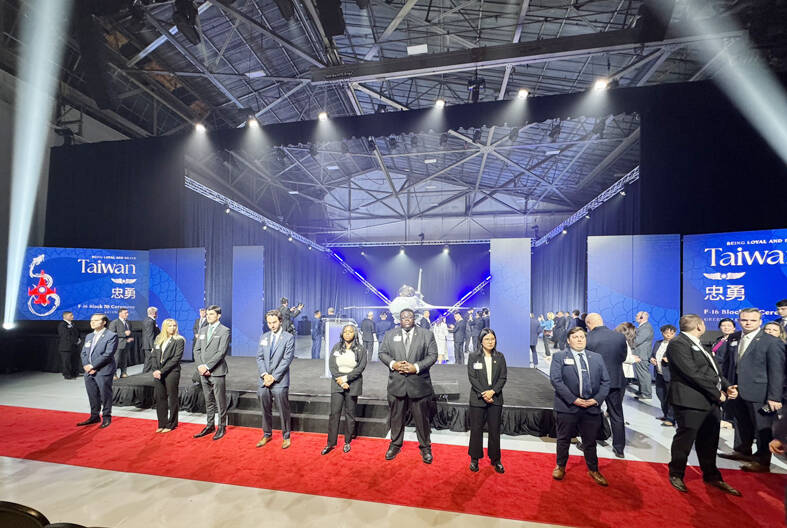F-16V jets purchased by Taiwan would be able to produce more thrust than the upgraded F-16A/B jets currently used by the air force, enabling them to have more weapon-mounting capacity, a defense expert said on Saturday.
Institute for National Defense and Security Research researcher Shu Hsiao-huang (舒孝煌) said the new F-16C/D Block 70 jets are equipped with a General Electric F110 engine.
The afterburning turbofan engine has 13,154.18kg of thrust, far more than the 10,432.64kg maximum thrust of the current F-16 engines, he said, adding that greater thrust means more weapon-mounting capacity.

Photo: Screen grab from Phil Hamby’s X account
Shu made the comments in response to media queries about the difference between the F-16s and the 66 F-16Vs ordered from the US, the first of which was unveiled at a delivery ceremony at Lockheed Martin’s production base in South Carolina on Friday last week.
Photographs posted on X by US Congressman William Timmons showed that the ceremony was attended by Representative to the US Alexander Yui and Deputy Minister of National Defense Po Horng-huei (柏鴻輝).
The jet in the picture is a two-seater F-16D model, Shu said.
It has an advanced active electronically scanned array radar and electronic warfare suite and comes with a US18E ejection seat.
It also has a larger air intake than the ones installed in the current F-16s, he said.
Taiwan purchased the 66 F-16Vs as part of an arms sale package approved in 2019 during US President Donald Trump’s first term in office.
The Ministry of National Defense said it expects to receive all the F-16C/D Block 70 jets by the end of next year, adding that the new jets would be deployed at the Taitung Air Base in eastern Taiwan.
The air force completed the upgrades of its more than 140 F-16A/B fleet to the F-16V in 2023.
The jets are equipped with more advanced avionics, including APG-83 Scalable Agile Beam Radar, a helmet-mounted cueing system, and other flight management and electronic warfare systems.

Alain Robert, known as the "French Spider-Man," praised Alex Honnold as exceptionally well-prepared after the US climber completed a free solo ascent of Taipei 101 yesterday. Robert said Honnold's ascent of the 508m-tall skyscraper in just more than one-and-a-half hours without using safety ropes or equipment was a remarkable achievement. "This is my life," he said in an interview conducted in French, adding that he liked the feeling of being "on the edge of danger." The 63-year-old Frenchman climbed Taipei 101 using ropes in December 2004, taking about four hours to reach the top. On a one-to-10 scale of difficulty, Robert said Taipei 101

Nipah virus infection is to be officially listed as a category 5 notifiable infectious disease in Taiwan in March, while clinical treatment guidelines are being formulated, the Centers for Disease Control (CDC) said yesterday. With Nipah infections being reported in other countries and considering its relatively high fatality rate, the centers on Jan. 16 announced that it would be listed as a notifiable infectious disease to bolster the nation’s systematic early warning system and increase public awareness, the CDC said. Bangladesh reported four fatal cases last year in separate districts, with three linked to raw date palm sap consumption, CDC Epidemic Intelligence

Taiwanese and US defense groups are collaborating to introduce deployable, semi-autonomous manufacturing systems for drones and components in a boost to the nation’s supply chain resilience. Taiwan’s G-Tech Optroelectronics Corp subsidiary GTOC and the US’ Aerkomm Inc on Friday announced an agreement with fellow US-based Firestorm Lab to adopt the latter’s xCell, a technology featuring 3D printers fitted in 6.1m container units. The systems enable aerial platforms and parts to be produced in high volumes from dispersed nodes capable of rapid redeployment, to minimize the risk of enemy strikes and to meet field requirements, they said. Firestorm chief technology officer Ian Muceus said

MORE FALL: An investigation into one of Xi’s key cronies, part of a broader ‘anti-corruption’ drive, indicates that he might have a deep distrust in the military, an expert said China’s latest military purge underscores systemic risks in its shift from collective leadership to sole rule under Chinese President Xi Jinping (習近平), and could disrupt its chain of command and military capabilities, a national security official said yesterday. If decisionmaking within the Chinese Communist Party has become “irrational” under one-man rule, the Taiwan Strait and the regional situation must be approached with extreme caution, given unforeseen risks, they added. The anonymous official made the remarks as China’s Central Military Commission Vice Chairman Zhang Youxia (張又俠) and Joint Staff Department Chief of Staff Liu Zhenli (劉振立) were reportedly being investigated for suspected “serious